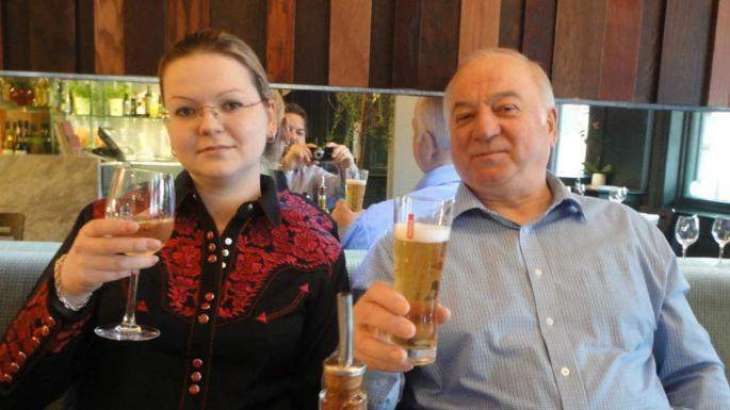The UK authorities announced on Wednesday that they had identified Russian nationals Alexander Petrov and Ruslan Boshirov as suspects in the Skripals poisoning.
MOSCOW (Pakistan Point News / Sputnik - 05th September, 2018) The UK authorities announced on Wednesday that they had identified Russian nationals Alexander Petrov and Ruslan Boshirov as suspects in the Skripals poisoning.
On March 4, former Russian double-agent Sergei Skripal and his daughter Yulia were found unconscious on a bench at a shopping center in the UK city of Salisbury. The United Kingdom and its allies promptly accused Moscow of having orchestrated the attack with what UK experts claim was the A234 nerve agent. Russia has strongly refuted the allegations as groundless. According to Russian Foreign Minister Sergey Lavrov, the case is falling apart due to absence of any proof of Moscow's involvement.
On Wednesday, the UK Crown Prosecution Service (CPS) said that it had sufficient evidence to charge two Russian nationals in their forties, Alexander Petrov and Ruslan Boshirov, in the Salisbury attack case. The Scotland Yard released pictures of the two suspects.
UK Senior National Coordinator for Counterterrorism Policing Neil Basu said that the suspects, with their Names likely to be aliases, arrived at London Gatwick Airport from Moscow on March 2. The two men traveled to the Salisbury area the following day suspectedly for reconnaissance purposes and on March 4 contaminated the Skripals' front door with the nerve agent, Basu said, citing CCTV footage. Later the same day, Petrov and Boshirov returned to London and shortly after left for Moscow, the coordinator added.
The UK authorities said did not intend to request Russia to extradite the two suspects, as the Russian constitution does not allow to hand over Russian nationals to foreign prosecution. However, a European arrest warrant has been issued, which will authorize any EU member state to detain the two men and extradite them to the United Kingdom, should they enter the European territory.
According to Basu, London will also seek the Interpol red notice for the suspects, who are not yet included in the international police wanted lists.
The Russian Prosecutor General Office told Sputnik on Wednesday that it was ready to cooperate with the UK authorities and hoped to get materials proving involvement of Russian nationals in the case.
The Russian Foreign Ministry said that it was not familiar with the names identified by the UK authorities as suspects in the Skripals case.
"The names, as well as the pictures, published in the media, tell us nothing," the ministry's spokeswoman Maria Zakharova said, calling for practical cooperation between the law enforcement bodies of the two countries rather than "public accusations and media manipulations."
The spokeswoman added that Russia had repeatedly sought cooperation with the United Kingdom on "such a serious case," but all the relevant requests had been rejected.
The Kremlin also said that the names of the suspects were unfamiliar.
"We have only heard or seen two names, but these names do not tell me personally anything ... Moreover, there was then a commentary by Scotland Yard that these names were supposedly fictional. I do not understand why this was done and what kind of signal the UK side sends. It's difficult to understand," Kremlin aide Yuri Ushakov said.
Following the CPS announcement, UK Prime Minister Theresa May told the parliament that London was going to deploy the "full range of tools" to counter the threat which Russia's Main Intelligence Directorate of the General Staff of the Russian Armed Forces (GRU) allegedly poses to the United Kingdom and its allies.
"We were right to say in March that the Russian state is responsible ... Based on a body of intelligence, the government has concluded that the two individuals named by the police and CPS are officers from the Russian military intelligence service, also known as GRU," May said.
May also refuted Russia's claims that it could be the United Kingdom itself to have produced the nerve agent used in the Skripals attack. According to the prime minister, only Russia had capacity to generate the toxic agent.
Russia's envoy to the Organization for the Prohibition of Chemical Weapons (OPCW) Alexander Shulgin said on Wednesday that London's accusations against Russia over the Skripals' poisoning were groundless.
Shulgin also commented on Tuesday's report by the OPCW which said that there was no confirmation that the nerve agents used in the attacks in the UK cities of Salisbury and Amesbury, where two people were exposed to supposedly the same military-grade nerve agent as the Skripals, were from the same batch.
"The contents of the report were rather vague, but it did not prevent the United Kingdom from immediately claiming that its point has been proven, it was Novichok again, it was Russia again, and other nauseous allegations of Russia's involvement," Shulgin told the Rossiya 1 broadcaster.
The Skripals case has already brought about an international row, with scores of Russian diplomats being expelled from the United Kingdom and other EU countries shortly after the attack. Moscow has expelled the same number of foreign diplomats from the missions of the states which sided with London on the case.




